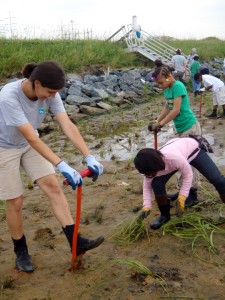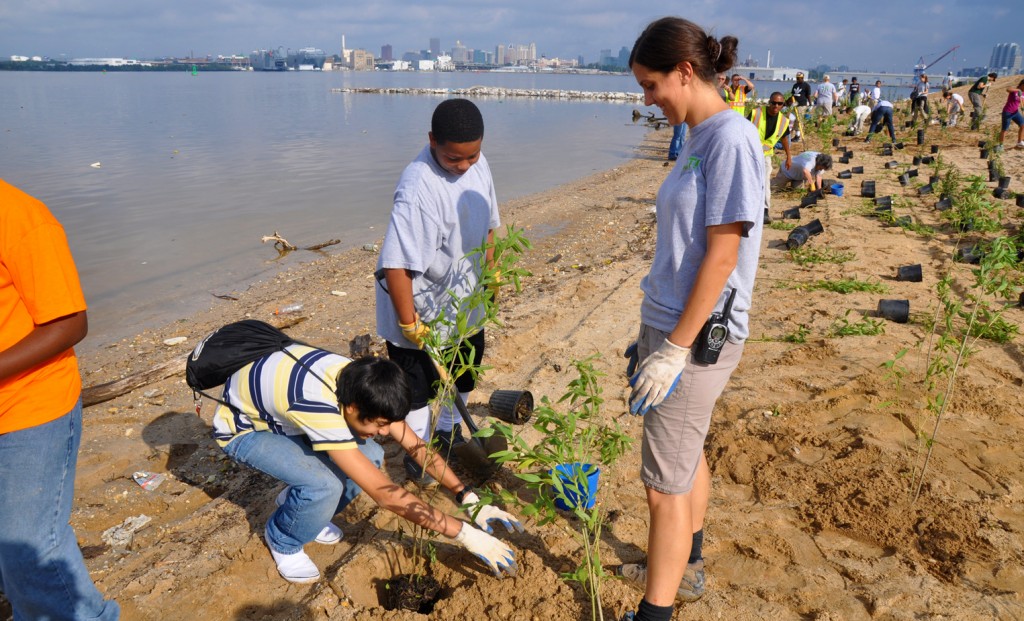Laura Cattell Noll, a 2009 Eastern Mennonite University (EMU) alum, is engaging students in restoration projects to build community awareness for the Chesapeake Bay.
Cattell Noll, a conservation technician, works within the Chesapeake Bay Initiative of the Conservation Department at the National Aquarium in Baltimore. Her work focuses on the restoration of the Chesapeake Bay watershed – specifically, implementing community-based wetland restoration projects.
“The projects are ‘community-based’ because we engage volunteers from the local area in the actual planting of the sites,” said Cattell Noll. “The idea is community members who help restore a wetland become invested in that site and want to protect it.”
Life after EMU
After graduating with a degree in environmental science, Cattell Noll began working with AmeriCorps in the Maryland Conservation Corps, assisting with several National Aquarium projects. When her two-year commitment was finished, Cattell Noll started an internship at the aquarium, which eventually led to a full-time position.
“When I talk to kids and other community members about environmental issues, I try to offer concrete steps that people can take in their everyday lives.”
Cattell Noll says she tries to not focus too much on “doom and gloom” concepts because people will not be motivated to make changes. Instead, she takes lessons learned from her time at EMU and weaves them into her presentations.

“At EMU I learned a lot about the day-to-day changes that I as an individual can make to improve our environment,” said Cattell Noll, a bi-national winner of the 2009 C. Henry Smith Peace Oratorical Contest. “I regularly encourage students to learn about and try recycling, composting, gardening and biking – ideas that I became intimately familiar with as a student.”
An outdoor classroom
Cattell Noll works specifically with students from the Terrapins in the Classroom and the Wetland Nursery Programs. In both programs, students are involved from start-to-finish in the project, raising fish and/or grasses in their schoolyard or feeding and measuring terrapins.
“The terrapin project is part of a larger research initiative to see if this ‘head start’ year helps increase survival rates of the diamondback terrapin,” said Cattell Noll.
Cattell Noll said her team monitors the sites for months and sometimes years after the initial project is finished.
“It’s really rewarding when a student or community volunteer has an ‘aha’ moment about the environment,” said Cattell Noll. “We hope the act of giving back to their local ecosystem inspires a personal shift towards stewardship of the environment.”
Not a typical job
When Cattell Noll is not visiting classrooms or leading initiatives, she’s involved in seasonal projects – planning for terrapin release and large-scale community restoration and plantings in upstate New York, Maryland’s eastern shore and Virginia Beach, among others.
“There is no such thing as a ‘routine’ day for me!”
While the manual labor and extensive work out of state can wear on anyone, Cattell Noll finds her most satisfying moments are when “the students become the teachers.”
“When we explained to one group of students that rainwater washes trash into the storm drains and then into the Bay, they were astounded,” said Cattell Noll. “A few months later, when we were planting grasses one student wondered aloud how all the trash got there. Before I could answer, all the kids were yelling, ‘Don’t you remember? It comes from the storm drains!’
“It’s rewarding to know that the message is getting through.”
